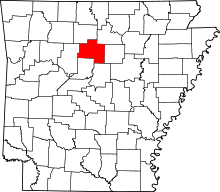Damascus, Arkansas
| Damascus, Arkansas | |
|---|---|
| City | |
 Location in Faulkner County and the state of Arkansas | |
| Coordinates: 35°22′1″N 92°24′37″W / 35.36694°N 92.41028°WCoordinates: 35°22′1″N 92°24′37″W / 35.36694°N 92.41028°W | |
| Country | United States |
| State | Arkansas |
| Counties | Van Buren, Faulkner |
| Area | |
| • Total | 1.9 sq mi (5 km2) |
| • Land | 1.9 sq mi (5 km2) |
| • Water | 0 sq mi (0 km2) |
| Elevation | 696 ft (212 m) |
| Population (2010) | |
| • Total | 382 |
| • Density | 201.1/sq mi (76.4/km2) |
| Time zone | Central (CST) (UTC-6) |
| • Summer (DST) | CDT (UTC-5) |
| ZIP code | 72039 |
| Area code(s) | 501 |
| FIPS code | 05-17290 |
| GNIS feature ID | 0076744 |
Damascus is a city[1] in Faulkner and Van Buren counties in the central part of the U.S. state of Arkansas. Its portion within Faulkner County is part of the Little Rock–North Little Rock–Conway Metropolitan Statistical Area. The population of Damascus was 382 at the 2010 census.
Geography
Damascus is located at 35°22′1″N 92°24′37″W / 35.36694°N 92.41028°W (35.366849, -92.410276).[2]
According to the United States Census Bureau, the town has a total area of 5.0 km² (1.9 mi²), all land.
Demographics
| Historical population | |||
|---|---|---|---|
| Census | Pop. | %± | |
| 1970 | 255 | — | |
| 1980 | 307 | 20.4% | |
| 1990 | 246 | −19.9% | |
| 2000 | 306 | 24.4% | |
| 2010 | 382 | 24.8% | |
| Est. 2015 | 383 | [3] | 0.3% |
2015 Estimate[5] | |||
As of the census[6] of 2000, there were 306 people, 137 households, and 90 families residing in the town. The population density was 61.2/km² (158.3/mi²). There were 157 housing units at an average density of 31.4/km² (81.2/mi²). The racial makeup of the town was 97.71% White, 0.98% Black or African American, 0.33% Native American, and 0.98% from two or more races. 1.31% of the population were Hispanic or Latino of any race.
There were 137 households out of which 26.3% had children under the age of 18 living with them, 53.3% were married couples living together, 7.3% had a female householder with no husband present, and 34.3% were non-families. 30.7% of all households were made up of individuals and 19.0% had someone living alone who was 65 years of age or older. The average household size was 2.23 and the average family size was 2.81.
In the town the population was spread out with 21.2% under the age of 18, 5.9% from 18 to 24, 25.2% from 25 to 44, 21.9% from 45 to 64, and 25.8% who were 65 years of age or older. The median age was 44 years. For every 100 females there were 96.2 males. For every 100 females age 18 and over, there were 88.3 males.
The median income for a household in the town was $28,977, and the median income for a family was $38,750. Males had a median income of $28,214 versus $16,458 for females. The per capita income for the town was $18,342. About 1.3% of families and 8.0% of the population were below the poverty line, including none of those under the age of eighteen and 22.2% of those sixty five or over.
Education
Public education for elementary and secondary school students is available from the South Side School District.
Nuclear incident
Damascus was the site of a nuclear "Broken Arrow" incident on September 18–19, 1980 when a Titan missile exploded, although no radiation was spread as a result of the explosion.
Notable person
- Kim Hammer, Republican member of the Arkansas House of Representatives from District 28 since 2011; raised in Damascus, born in Rockford, Illinois
References
- ↑ Local.Arkansas.gov - Damascus, retrieved September 3, 2012
- ↑ "US Gazetteer files: 2010, 2000, and 1990". United States Census Bureau. 2011-02-12. Retrieved 2011-04-23.
- ↑ "Annual Estimates of the Resident Population for Incorporated Places: April 1, 2010 to July 1, 2015". Retrieved July 2, 2016.
- ↑ "Census of Population and Housing". Census.gov. Archived from the original on May 11, 2015. Retrieved June 4, 2015.
- ↑ "Annual Estimates of the Resident Population for Incorporated Places: April 1, 2010 to July 1, 2015". Retrieved June 2, 2016.
- ↑ "American FactFinder". United States Census Bureau. Archived from the original on September 11, 2013. Retrieved 2008-01-31.
Further reading
- Schlosser, Eric (2013). Command and Control: Nuclear Weapons, the Damascus Incident, and the Illusion of Nuclear Safety. New York, NY: The Penguin Press. ISBN 978-1-59420-227-8.

